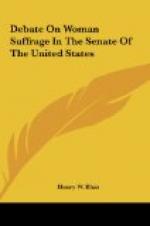Help us to stand upon the same political footing with our brother; this will open both his and our eyes and compel him to stand upon the same moral footing with us. Only this can usher in millenium’s dawn.
This letter is signed, by Hannah E. Patchin, postmaster at New London, Wis.
As bearing upon the extent of this agitation, I have many other letters of the same character and numerous arguments by women upon this subject, but I can not ask the attention of the Senate to them, for what I most of all want is a vote. I desire a record upon this question. However, I ought to read this letter, which is dated Salina, Kans., December 13, 1886. The writer is Mrs. Laura M. Johns. She is connected with the suffrage movement in that State, and as bearing upon the extent of this movement and as illustrative not only of the condition of the question in Kansas, but very largely throughout the country, perhaps, especially throughout the northern part of the country, I read this and leave others of like character, as they are, because we have not the time:
I am deeply interested in the fate of the now pending resolution proposing an amendment to the Constitution of the United States, conferring upon women the exercise of the suffrage. The right is theirs now.
I see, in speaking to that resolution on December 8 in the Senate, that you refer to Miss Anthony’s experiences in the October campaign in Kansas as evidence in part of the growth of interest in this movement, and of sentiment favorable to it, and I am writing now just to tell you about it.
When I planned and arranged for those eleven conventions in eleven fine cities of this State, I thought I knew that the people of Kansas felt a strong interest in the question of woman suffrage; but when with Miss Anthony and others I saw immense audiences of Kansas people receive the gospel of equal suffrage with enthusiasm, saw them sitting uncomfortably crowded, or standing to listen for hours to arguments in favor of suffrage for women: saw the organization of strong and ably officered local, county, and district associations of the best and “brainiest” men and women in our first cities for the perpetuation of woman suffrage teachings; saw people of the highest social, professional, and business position give time, money and influence, to this cause; saw Miss Anthony’s life work honored and her feted and most highly commended, I concluded that I had before known but half of the interest and favorable sentiment in Kansas on this question. These meetings were very largely attended, and by all classes, and by people of all shades of religious and political belief. The representative people of the labor party were there, ministers, lawyers, all




